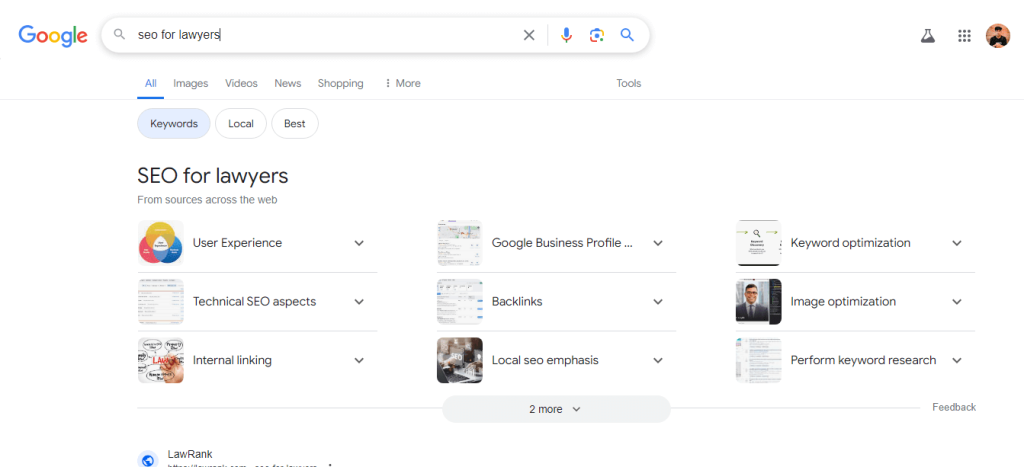ON THIS PAGE

For a free estimate and consultation, fill the form below and our team will get back to you as soon as possible.
SEO for Law firm websites have never been more important in this online age.
You need SEO to ensure your site ranks at the top when people search for related information online.
In essence, SEO for lawyers consists of legal-focused SEO tactics meant to get your law firm website ranking higher in SERPs.
In this post, we cover aspects of lawyers SEO, including Google’s ranking factors, useful tips on keyword research, and content optimization.
Google Ranking Factors
Google’s powerful algorithm considers countless factors when ranking web pages.
This guide outlines everything lawyers need to know about the most important ranking factors.
- Content Quality: The content must be high-quality, related to their needs, and question potential client types. Legal content should be educational, accurate, and readable by the average person, while also demonstrating expertise.
- Backlinks: The high-quality websites linked to your law firm website are important. Quality backlinks from authoritative legal websites or reputable sources enhance your website’s credibility and Google ranking.
- User Experience (UX): Google prioritizes websites that offer a positive user experience. Page load speed, mobile-friendliness, and easy navigation contribute to better rankings.
- Security: Google favors websites that use HTTPS encryption (SSL certificate). This ensures data security and builds trust with users.
- Technical SEO: There are also technical aspects of SEO, such as meta tags, headers, alt-image texts, and the correct indexation of pages on your site.
Keyword Research For Lawyers

Lawyers should prioritize keyword research to maximize their brand’s SEO potential, especially in competitive fields like accident lawyers.
At the heart of this process is identifying your firm’s legal services and the precise keywords potential clients use when seeking a lawyer.
These tools help discover high-volume, low-competition keywords relevant to your practice areas, including Google Keyword Planner, SEMrush, Ahrefs, and tools tailored for accident lawyers.
By leveraging these tools, lawyers can strategically integrate keywords into their website content, meta descriptions, and blog posts, enhancing search engine visibility and attracting targeted traffic.
By adding new keywords into the mix, law firms can keep up to date with trends and stay ahead of how clients may change their searches.
This loop ensures their digital marketing efforts remain relevant and effective over time.
Rank Tracker tool provides lawyers with insights to enhance keyword strategies, expand reach, convert leads, and thrive in legal competition.
Content Optimization For Lawyers
The practice involves creating high-quality attorney content for digital marketing purposes and strategically embedding chosen keywords in website pages, blog posts, articles, etc.
Finding a balance between keyword optimization and readability will keep your law content useful and appealing while boosting visibility on search engines efficiently.
Create content that directly addresses legal questions, building authority and trust with prospects and driving organic site visits.
Key Strategies for Content Optimization:
- Incorporate targeted keywords into content throughout all verticals, improving organic traffic.
- You should provide great details and make more and more legal articles.
- Update content regularly to comply with new legal trends.
- Be straightforward and use the language of your audience.
- Use call-to-action CTAs to increase user involvement and conversion.
Link Building For Lawyers

Today, link building is one of the cornerstones of a successful SEO strategy for lawyers who want to increase their online visibility.
You need to have a source for links from respected and authoritative legal directories, industry publications, and legally accredited sites.
Build backlinks by guest posting on relevant legal blogs, participating in legal forums, and networking within the legal community for a robust backlink profile.
If lawyers get some high-quality backlinks, they can increase the online authority of their firm – leading to improved search rankings.
On/Off Site SEO For Lawyers
For Lawyers, the world of search engine optimization calls for an all-encompassing plan that includes both on-site and off-site factors.
On-site SEO optimizes website elements (meta tags, headers, content, internal links) for keywords and user experience improvement.
Off-site SEO explains external signals like high-quality backlinks from high DA sites and social bookmarking that can impact page ranking.
Whether you tackle SEO alone or hire a digital marketing firm, integrating on-site and off-site tactics boosts your online presence, attracts leads, and maintains competitiveness in your industry.
Organic VS Paid Ads: Does It Matter?

Choosing between organic SEO and paid advertising is one of the most important questions in digital marketing, and it will define visibility and results.
Organic SEO boosts website visibility through unpaid search results, using techniques to improve rankings and build long-term credibility for sustained growth.
In contrast, paid advertising like Google Ads provides instant visibility but must be continuously funded to keep traffic and visibility up.
Ultimately, it depends on your ROI objectives and marketing budget for when you want your digital marketing to work.
Local SEO is crucial for lawyers targeting nearby clients, involving optimizing Google My Business profiles with accurate information, positive reviews, and consistent directory listings.
Additionally, using local citations with geo-targeted keywords increases visibility in local search results, which inspires trust and helps channel more qualified leads your way.
By consistently cultivating local SEO strategies, firms can maintain competitiveness, enhance accessibility, and secure their share of local searches, paving the way for continuous client acquisition and business expansion.
Tracking SEO Results
![]()
Content optimization is pivotal in the strategies of lawyers SEO, focusing on strategically placing targeted keywords across platforms like web pages, blog posts, and articles.
The key is to balance using keyword phrases subtly while creating legal content that not only attracts visitors from search engines but also engages them enough to learn from the post.
By doing so, it increases, but you both get more organic web traffic due to addressing your key personas’ legal queries and interests.
Show that you are a credible source with expertise by offering no-nonsense, honest, informative content that meets the needs and questions of potential consumers.
In order to be successful, law firm content optimization requires updating and revising content often to stay fully relevant to current legal trends and developments.
This ensures that even after some time, information retains its value and the practice’s reputation as a trusted adviser in the legal technology market.
Plus, the proper and succinct language used in the content helps easily digest the intricate legal terminologies to its readers.
The content also strategically included calls-to-action within the text to drive user engagement and conversion, helping to guide traffic towards the firm contact or consultation booking pages.
Consistency is crucial for lawyers implementing these strategies in their legal content marketing, ensuring steady organic traffic and fostering long-term client relationships.
Conclusion
Portraying an effective SEO strategy for lawyers SEO or getting your law firm in the ‘Top ten search results’ is no less than visibility or a stroll down memory lane – but rather a way to cut through the competition and gain more clients online, including injury lawyers.
Law firms can establish a strong online presence in their legal domains by researching optimal keywords, optimizing for Google ranking factors, and employing ethical SEO tactics to enhance content and backlink profiles.
This could be via on-site optimizations or off-site activity, all aiming to attract relevant leads and drive strong relationships.
Lawyers need only to keep fine-tuning their SEO and adapting to the always-shifting paradigm of the digital world.
They can effectively find themselves at the top of this online visibility minefield, well-situated for long-term growth in a digital marketplace.
Attorney SEO FAQ
How long does it take to see results from SEO efforts?
Depending on competition and authority of your website and how good are you At Implementing The Strategies.
In general, visible improvements are possible after some time, often a matter of several months to a year.
Can lawyers handle SEO themselves, or should they hire a professional SEO agency?
An experienced SEO agency that focuses exclusively on SEO for law firms can offer expertise, save time, and deliver better results in a competitive market than what the average firm may be able to handle in-house.
What are some common SEO mistakes lawyers should avoid?
Local SEO is taken for granted, keyword stuffing, mobile optimization is completely disregarded, content quality is overlooked and last but not the least no monitoring of SEO performance is done.
Is content marketing important for lawyer SEO?
Yes, but it should not be ignored that content marketing in lawyer SEO is indispensable to establish authority among the target audience and provide answers to legal questions for new potential clients with organic traffic through relevant, information based content.
How often should lawyers update their website’s content?
Keeping website content updated and publishing regular blog posts and practice area pages show a search engine that your site is up-to-date on best practices, which can then improve SEO.
This means focusing on frequent updates about recent legal changes, or common client FAQs.
